How to Say Yes In Hebrew
Hello!
Yes, you’re here to learn Hebrew. So, let me tell you up front. “Ken” means “Yes” in Hebrew. If that’s the only word you need to know, now you’re done.
But, if you want to learn more, keep on reading. This quick Hebrew lesson will give you all of the ways of saying yes and agreeing in Hebrew.
Top 15 Positive Hebrew Words
Now, as you read these, be sure to listen to this free audio lesson too. Why? You get to hear REAL Hebrew pronunciation. And if you repeat out loud, you’re practicing speaking. So, press the play button below.
- Lesson by HebrewPod101 – a Hebrew Learning Program
- Click here to get MORE Easy Hebrew Audio/Video Lessons
1. Yes in Hebrew
- כן
- Pronounced: ken
This is the easiest way to say yes in Hebrew. You can use “כן” in both, formal and informal situations, just like you would use “yes” in English.
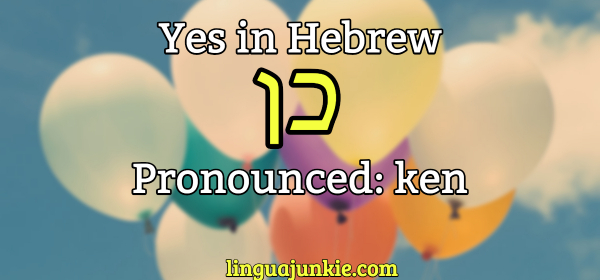
Example:
- כן, את באמת צודקת
- Ken at beemet tzodeket
- Yes, you are actually right.
2. Of course
- כמובן
- Pronounced: kamuvan
“כמובן” is a very frequently used word in Hebrew, especially in everyday speech. You can use it when someone asks you to do something and you are glad to help. It expresses your eagerness and easygoing attitude.
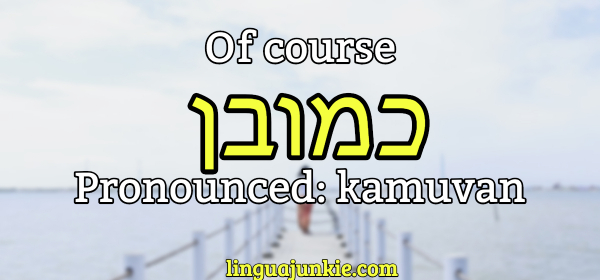
Example:
- כמובן שאני מקשיבה לך
- Kamuvan sheani makshiva leh’a
- Of course I’m listening to you (male).
3. No problem
- אין בעיה
- Pronounced: ein beaya
Yes, you can use this phrase just like you would in English. When someone asks you for help and you say “no problem,” you are actually letting them know that this task is easy for you and you are happy to lend them a hand.
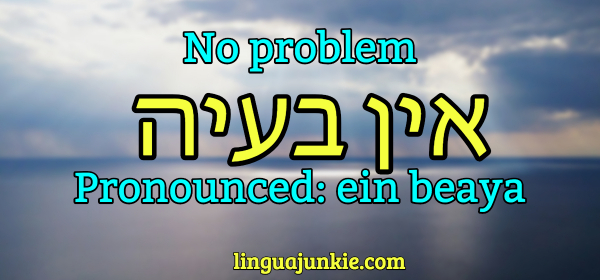
Example:
- אין בעיה, אני אתקן את זה בשנייה
- Ein beaya, ani etaken et ze beshniya
- No problem, I’ll fix it in just a second.
4. Indeed
- אכן
- Pronounced: ah’en
You won’t likely hear “אכן” in informal conversations. It’s quite polite. The word “אכן” also means: really, actually and truly.

Example:
- הדבר הזה אכן קרה
- Hadavar haze ah’en kara
- It did really happen.
5. Yes indeed
- אכן כן
- Pronounced: ah’en ken
Remember “ken?”
Yes? Now, you can probably guess what the other word is. It’s indeed.
This is another more formal way to say yes in Hebrew. What you have here is actually the combination of two Hebrew words: “אכן” (indeed) and “כן” (yes). Literally, it means “Indeed yes.”
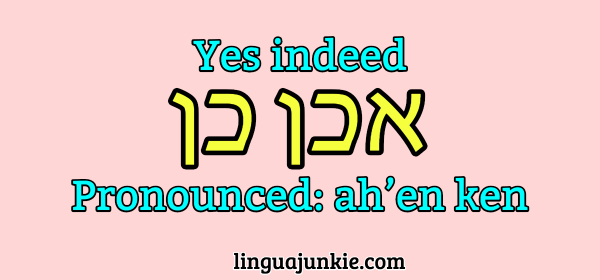
Example:
- אכן כן, עכשיו באמת חם מאוד בחוץ
- Ah’en ken, ah’shav beemet h’am meod bah’utz
- Yes, indeed, it’s really hot outside now.
6. Why not?
- למה לא?
- Pronounced: lama lo?
“למה” (lama) is the Hebrew for “why” and “לא” is the Hebrew for “no”.
This is a very simple and easy Hebrew phrase to remember. Say it with me. “Lama lo.”
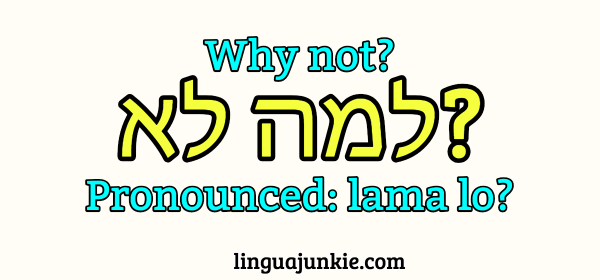
Example:
- למה לא? תמיד אפשר לנסות
- Lama lo? Tamid efshar lenasot
- Why not? We can always give it a try.
7. Well, yes
- ובכן כן
- Pronounced: uvh’en ken
Our friend “ken” is back again.
So, if you want to express uncertainty or some shade of “polite” disagreement, you can say “ובכן כן” for this purpose.
You can use this phrase in formal and informal situations.
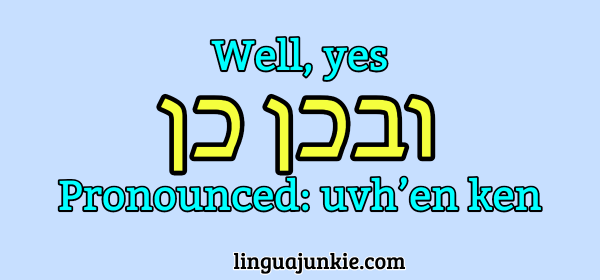
Example:
- ובכן כן, יכול להיות שאתה צודק
- Uvh’en ken, yah’ol lihiyot sheata tzodek
- Well, yes, you (male) might be right.
8. I understand / got it
- הבנתי
- Pronounced: hevanti
You use “hevanti” when you want to let the other speaker know that you completely understand them.
The same form is used both for females and males.
If a group of people want to say “got it,” you would have to say “הבנו” (pronounced: hevanu). This can be literally translated as “we have understood.”
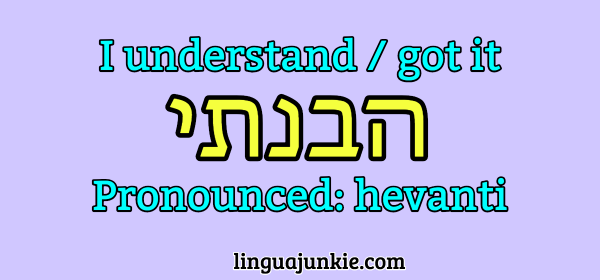
Example:
- הבנתי למה אתה מתכוון
- Hevanti lema ata mitkaven
- I understand what you (male) mean.
9. I agree (male)
- מסכים
- Pronounced: maskim
“מסכים” can be said only by a male.
If you’re a female, it would be: “מסכימה” (pronounced: maskima)
For 2 + males or a mixed group of males and females, you use: “מסכימים” (pronounced: maskimim)
And, for 2 + females it’s: “מסכימות” (pronounced: maskimot).
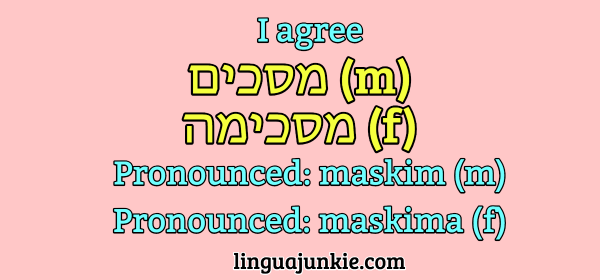
Example:
- אנחנו מסכימות איתך
- Anah’nu maskimot it’h’a
- We (females) agree with you (a male).
10. Right
- נכון
- Pronounced: nah’on
You say this one when you agree with somebody on something.
This one is formal and informal, and it sounds natural in both situations.
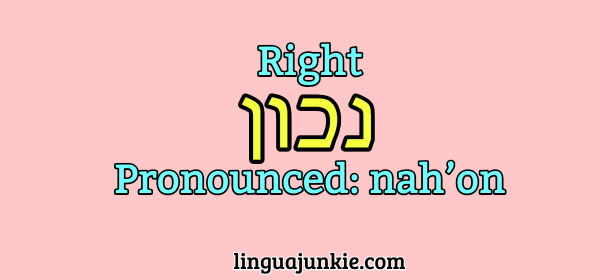
Example:
- נכון! באמת חשוב לשמור על כושר
- Nah’on! Beemet h’ashuv lishmor al kosher
- Right! It’s really important to keep fit.
11. Certainly / Definitely
- בוודאי
- Pronounced: bevadai
“Bevadai” has a casual and easygoing nuance. You can use it while having an informal conversation with your Hebrew speaking friends.
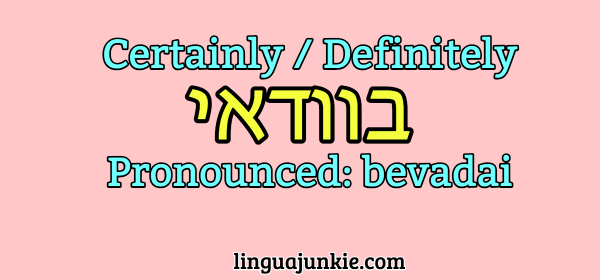
Example:
- בוודאי, אני בוטח בך
- Bevadai, ani boteah’ beh’a
- Certainly, I trust you (male).
12. Sure / Of course
- בטח
- Pronounced: betah’
Are your ready? Ready for another casual way to say yes in Hebrew? Yes, “betah” can only be used casual conversations. Why? Because in some cases, “בטח” might have some sarcastic meaning (for sure, when pigs fly, no way!)
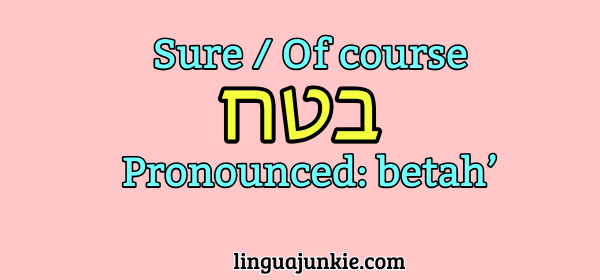
Example:
- בטח! יש לי הרבה זמן פנוי עכשיו
- Betah’! yesh li harbe zman panuy ah’shav
- Sure! I have a lot of free time right now.
13. Yes – Literary
- הן
- Pronounced: hen
First there was ken.
Now, there’s hen.
You won’t hear many people say “הן” in their everyday speech. You are more likely to find this word in literary works and in the First Testament of The Bible. So, good word to know if you’re learning Biblical Hebrew!

14. Maybe / Probably yes / Perhaps
- יכול להיות
- Pronounced: yah’ol lihiyot
You can use “יכול להיות” when you’re not 100% sure about something.
But, you can use it only in colloquial conversations.
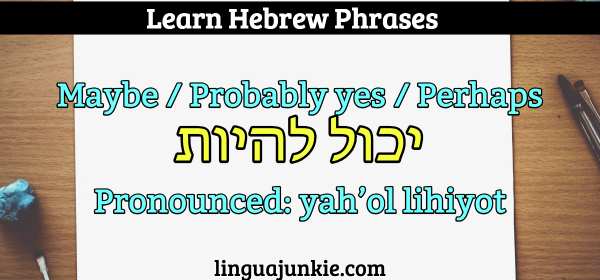
Example:
- יכול להיות, אבל זה עלול להיות מסוכן
- Yah’ol lihiyot, aval ze alul lihiyot mesukan
- Maybe, but is might be dangerous.
Now, you know a whole bunch of ways to agree and say YES in Hebrew. Why is this important? Well, it means you can now express yourself in many ways. Being able to do so means you’re quite fluent!
Want to keep this lesson?
Print it out and re-read it every now and them!
Other lessons you will love:
- How to Learn Hebrew in 5 Minutes a Day (STUDY TOOLS inside)
- How to Learn Hebrew: The NICE, Ultimate Guide for Beginners
- Top 20+ Hebrew Learning Websites for Curious People
– The Main Junkie
P.S. Done with reading articles and want to learn Hebrew for real?
Okay! I recommend HebrewPod101.com — an online learning program with audio/video lessons made by real teachers. You can learn to speak, read and write, AND take your lessons on any device.
Please click here to visit HebrewPod101 and Learn Hebrew with Easy Lessons
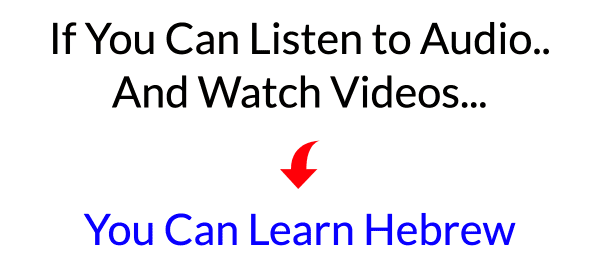
Ahmen call me…
not funny… Next time call me 🙁